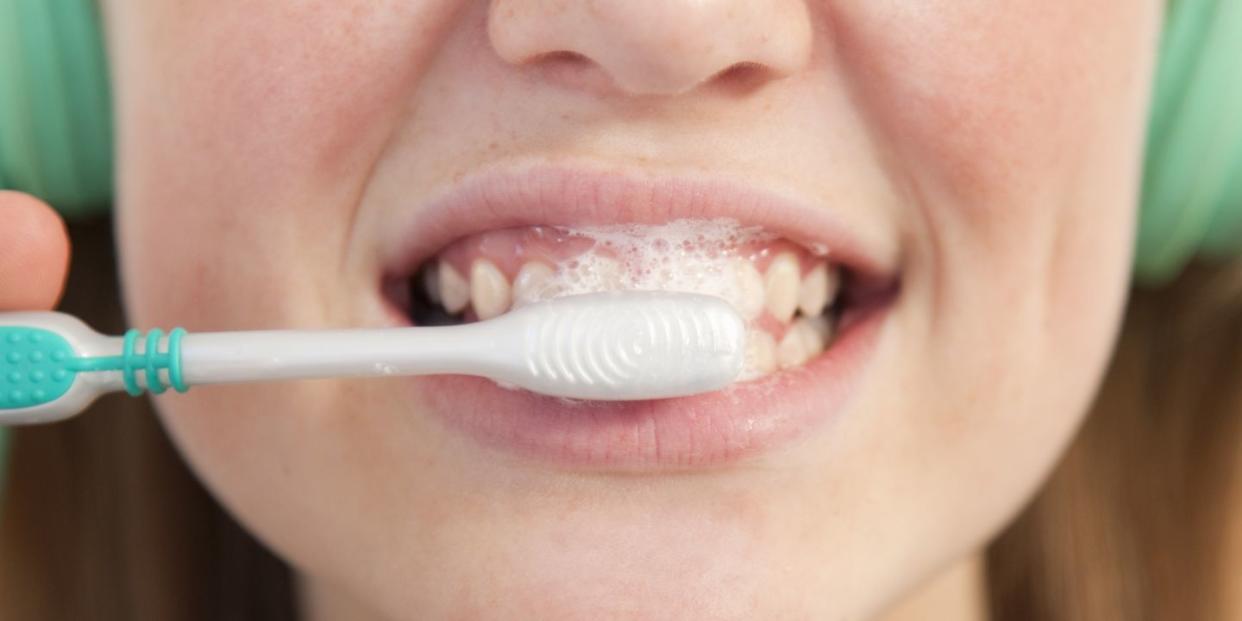Here's How Often/How Long You Really Need To Brush and Floss Your Teeth

Brushing your teeth should be a given. Considering we’ve been doing it since we were 18 months old, you’d expect us to be professionals by now. Unfortunately, many of us are brushing the wrong way and not often enough. Let’s not even talk about flossing! Here are some recommendations we received from dentists and dental connoisseurs.
According to a study reported from the 2005 Oral Health & Preventive Dentistry Magazine, brushing your teeth once a day is enough to prevent cavities and periodontal diseases, but in order to successfully keep your pearly whites germ free, it is recommend you brush twice a day. While the debate over the benefits of flossing are still ongoing, most dentist recommend flossing at least once a day in order to stave off tooth decay. Even though the 2015 Eighth Edition Dietary Guidelines for Americans report did not include flossing as an essential tool in healthy tooth preservation, most dentist and orthodontist you visit will recommend this practice.
With newer tool developments, brushing and flossing has never been easier. Rotary brushes are widely available from most retailers and offer benefits that most standard brushes don’t. We're also seeing a rise in the use of sustainable toothbrushes that are better for the environment. Water flossers provide an easier and faster alternative to flossing, but aren't as effective.
“I personally prefer using an electric rotary toothbrush (meaning it spins in a circular oscillating pattern) because it mimics the ideal pattern of brushing. As much as we all hate flossing, don’t forget how crucial flossing is to maintaining good oral health!” says Andre Gonzalez, DMD.
These are some of the most commonly asked questions about brushing your teeth and flossing. Make sure to consult with your dentist on any questions or concerns you might have about your own oral health.
How often should you brush your teeth per day?
Brushing your teeth at least once a day is recommended, but dentist say brushing twice a day is most effective. Depending on how you brush, bacteria can stay in-between your teeth even after a cleaning. To ensure a maximum clean, brush once in the morning and once in the evening before bedtime. Be careful after brushing not to drink anything acidic. The acid found in drinks and juices like orange juice can weaken your enamel and cause permanent damage
How long should you brush your teeth?
We all know life can get pretty busy and time is never guaranteed, but dentists recommend brushing your teeth for at least two minutes. No matter what kind of toothbrush you use, two minutes is strongly suggested.
What’s the suggested way of brushing your teeth?
Think of your tooth having four parts, the gum line, the front, the back and the roof. When brushing make sure to clean all four areas using a circular motion at a 45 degree angle. Pay special attention to your gum line, having healthy gums is just as important as having healthy teeth.
Is it safe to leave toothpaste on your teeth after brushing?
Yes, the fluoride commonly found in toothpaste is extremely healthy. It can strengthen enamel and kill bacteria.

Is flossing still important? If so, what alternatives are there if you dislike it?
As mentioned, the debate over the benefits of flossing are ongoing. Most dentists and orthodontists strongly recommend flossing at least once a day. Flossing can remove as much as 40% of plaque around your teeth, which is important since brushing can only remove as much as 60% of plaque and bacteria. Water flossing is a popular alternative but beware, nothing is as effective as the original string.
Do you recommend rinsing with Listerine after brushing?
Similar to most toothpaste, Listerine is filled with fluoride. Listerine also kills the germs and bacteria that cause bad breath.
How quickly should you brush after eating?
To avoid any damage, it’s highly recommended you brush your teeth at least 30-minutes after you eat.
How many times should you visit the dentist?
Try to make it to the dentist at least once every six months for routine exams and screenings. Although scary, this can help avoid long-term problems and offer solutions to common concerns.
Are brushing methods the same for adults, teens, children and seniors?
Brushing your teeth is crucial during early development. Creating good habits early can save money and help establish a healthy confidence. Brushing methods for adults and seniors are the same. Most dentist agree that if healthy habits are formed early on, they can be carried on for life without many changes.
As you age, what should you look out for regarding your dental care?
If any problems arise, it could be a build-up and not because of your age. That’s why it’s important to see a dentist twice a year to make sure you’re able to catch those problems before they become long-term issues.
You Might Also Like


